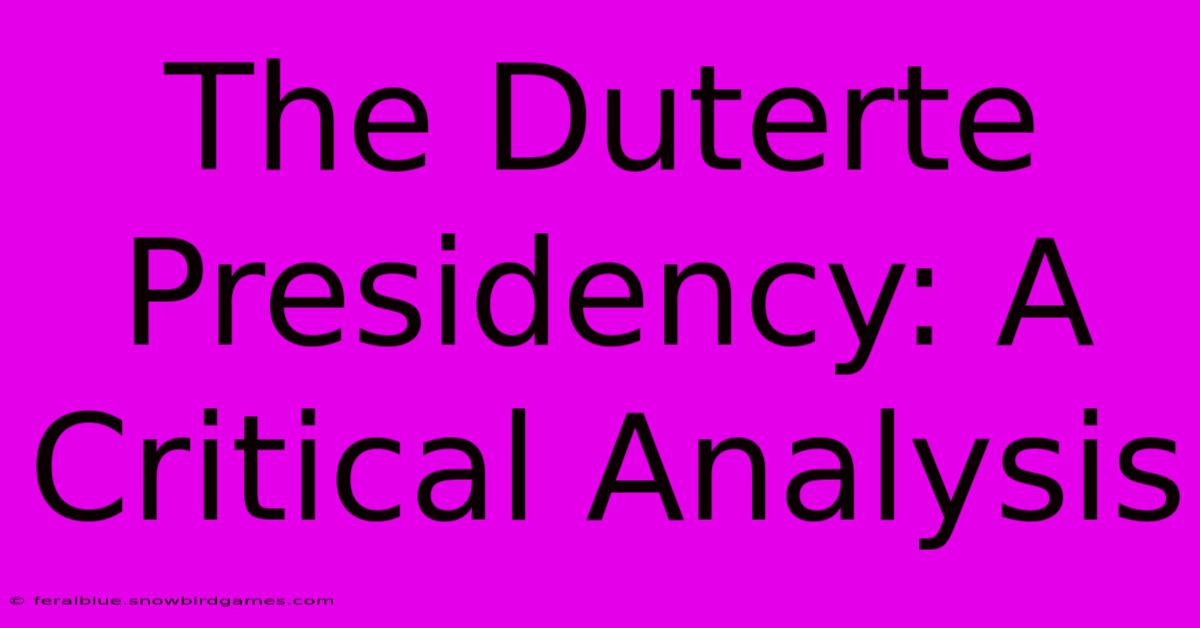The Duterte Presidency: A Critical Analysis

Table of Contents
The Duterte Presidency: A Critical Analysis
The presidency of Rodrigo Duterte in the Philippines (2016-2022) remains a highly debated and controversial topic. His administration was characterized by a strongman approach, a "war on drugs," and significant shifts in domestic and foreign policy. This analysis critically examines key aspects of his presidency, weighing both its achievements and its considerable criticisms.
The "War on Drugs" and Human Rights Concerns
Duterte's most defining policy was his brutal "war on drugs." This campaign, launched with a promise to eradicate drug crime, resulted in the deaths of tens of thousands of Filipinos, sparking widespread international condemnation. Human rights organizations documented extrajudicial killings, police brutality, and a climate of impunity. While the administration claimed these deaths were the result of legitimate police operations, the lack of due process and the sheer scale of the killings raised serious concerns about human rights violations. The sheer number of deaths overshadowed any purported successes in reducing drug-related crime. This aspect of his presidency remains a deeply divisive issue and a stain on his legacy.
The Impact on Human Rights
The chilling effect of the drug war extended beyond the immediate victims. Fear of police brutality led to self-censorship and stifled dissent. Extrajudicial killings became a tool of intimidation, silencing critics and consolidating power. This created a climate of fear which significantly impacted civil liberties and freedom of expression.
Economic Policies and Infrastructure Development
Duterte's administration prioritized infrastructure development under the "Build, Build, Build" program. This ambitious initiative aimed to upgrade the country's infrastructure, boosting economic growth and connectivity. While some progress was made in building roads, bridges, and other infrastructure projects, critics raised concerns about the transparency and efficiency of these projects. Questions regarding debt sustainability and the potential for corruption also plagued the initiative.
Economic Growth and Inequality
While economic growth was reported during parts of his term, concerns remain regarding the distribution of wealth. The benefits of economic growth did not reach all sectors of society equally, leaving many Filipinos still struggling with poverty and inequality. The gap between the rich and the poor remained a significant challenge.
Foreign Policy Shifts and International Relations
Duterte's foreign policy represented a significant departure from the Philippines' traditional alliance with the United States. He pursued closer ties with China and Russia, while adopting a more independent and less confrontational stance towards these global powers. This pivot in foreign policy raised concerns about the Philippines' national security and its position within regional alliances.
The Pivot to China and Russia
This realignment of foreign policy, while aiming for greater autonomy, also sparked debate about the potential compromises on national sovereignty and territorial disputes in the South China Sea. Navigating the complex geopolitical landscape required a delicate balance that some argued Duterte's administration failed to achieve fully.
Conclusion: A Legacy of Contradictions
The Duterte presidency presents a complex and contradictory legacy. While proponents point to infrastructure development and a more assertive foreign policy, the immense human cost of the "war on drugs" overshadows many of his achievements. His administration's legacy will be debated for years to come, forcing a reckoning with the difficult questions of human rights, economic justice, and the balance between national security and international relations. The long-term consequences of his policies continue to unfold, shaping the political and social landscape of the Philippines. Understanding the full impact of his presidency requires a comprehensive and critical analysis, considering both its successes and its devastating failures.

Thank you for visiting our website wich cover about The Duterte Presidency: A Critical Analysis. We hope the information provided has been useful to you. Feel free to contact us if you have any questions or need further assistance. See you next time and dont miss to bookmark.
Featured Posts
-
David Millers Daughter The Search Continues
Apr 07, 2025
-
Captain Tom S Daughter A Legacy Of Kindness
Apr 07, 2025
-
Ilari Sahamies From Zero To Millionaire
Apr 07, 2025
-
Kai Watts The Impact Of His Mothers Success
Apr 07, 2025
-
The Next Beckham Generation Arrives Soon
Apr 07, 2025
